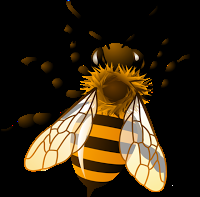
It was a sad day for me. I recently had to have some trees cut down in my yard. A big old elm and two big maples, because they have died. The elm probably died of old age…it hasn’t looked very well for several years. The maples seem to have not survived some recent drought summers. None of them looked very good, and they were all probably more dangerous than I care to admit, but still, I hate to cut down trees. It probably goes back to my love of my childhood tree house. In most places where I have lived, I have planted trees, bushes, flowers, and more. To cut down a tree is just not something I relish, necessary though it may have been.
However, there was a surprise in the cutting. One of the elm branches was hollow, and the home of a honey bee hive. The tree trimmer showed me where the branch had fallen, described the stings he had suffered, then asked whether I wanted him to load that piece up with the rest the fallen branches to the tree dump. I asked him to leave it.
Over the years, I have seen articles here and there about how the honey bee population has been declining in recent years, and the concern some have that the downturn could be dangerous if it persists, since fruit trees and other important vegetation are dependent upon the bees for fertilization. I decided we needed to see if we could locate a local beekeeper who might rescue the hive, although I also thought it might be fun to set up a hive myself, but the timing isn’t good for that for lots of reasons.
It took several days and numerous phone calls to find someone who could come to take the bees. A local beekeeper did, but not until after a good number of them had died due to the cold and the trauma of the fall. While I wasn’t here when he took the combs, my wife was, and she said he was concerned whether they might survive or not, but would give it his best shot. The man sent me a text stating that he wasn’t sure how good their chances were, and I replied that they had a better chance if he took them and tried than if they were simply left to die on the ground.
My tenderheartedness toward bees even applies when I’m mowing and working on the lawn. I have seen some taking pollen off the clover in the yard, and as a result have gone around the section to let them finish before going back to mow that area. I even chose not to put the kind of weed killer down that would kill the clover, just because I knew the bees liked it, even though I had no idea the bees lived in that old elm tree. I know, kind of dumb, but it is just one of many ways that I am a sap!
You know, sometimes in life we have opportunities to do little things that might make a small difference in the world. It may not be a big thing that would be considered newsworthy. My wife’s is to rescue critters that other people have dumped, and then find a good home for them. I guess mine this week was honeybees. Sometimes little things can make a big difference in the lives of spouses, children, friends, and even strangers we meet day by day, as well as the impact we have on nature around us. This week, how about sowing some seeds of kindness or joy in the lives of people you meet.

